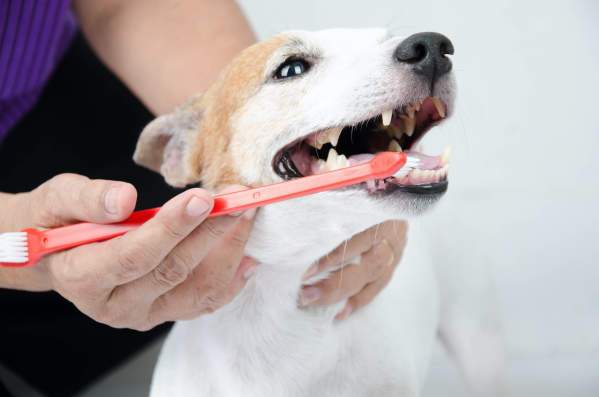We’ve all been there. Your dog leans in for a kiss or just pins their front paws on your chest panting in your face for attention. It would be adorable... but their bad breath is less than desirable. Of course, if it’s your dog, it's easy to forgive what they’ve just done to your nose hairs—you love them unconditionally. But if it’s someone else on the receiving end of your doggy's love, they sheepishly shake their head from side to side to avoid your dog's face—and no one wants that.
Unfortunately, the consequences for poor cat and dog dental health extend far beyond bad breath. Read on to understand why taking care of your pet's teeth is so important—and how it can save their life.
Why your pet's dental health is so important
Your pet’s oral health is vital for their overall wellbeing. While they many not feel connected, dental problems can lead to other health issues in your pet and vice versa. Staying on top of your pet’s teeth and gums, as well as taking them for a dental check-up and cleaning at least once a year, will keep them healthy and ensure you detect any potential health problems early on. If you’ve got a dachshund, yorkie, bulldog, or really any small breed, you may even want to schedule an oral examination every six months, as they’re more prone to oral health problems.
Despite its importance, dental health remains overlooked. In fact, according to the American Veterinary Medical Association (AVMA), 80% of dogs and 70% of cats have some form of periodontal (gum) disease by the age of 3, and that’s simply due to poor flossing and brushing habits. Periodontal disease is irreversible, which makes it all the more dangerous.
If periodontal disease isn’t effectively treated in your pet, it can cause a lot of pain and lead to other health problems in their liver, heart, and kidney. It starts with plaque. Uncleaned plaque turns into tartar. Usually, the tartar above the gum line is easily removed, but if it’s below the gum line, where it isn’t visible, that's a prime location for infections and other damage to their jaw and tissues. Pets don’t have opposable thumbs, so let’s help them out!
Signs your pet has dental health issues
You know when something, metaphorically, leaves a bad taste in your mouth? Well, that's literally a sign that something could be wrong with your pet's dental health. “Doggy breath” is a myth. One of the tell-tale signs of periodontal disease is halitosis, or bad breath. But it doesn’t stop there. Other common signs to watch out for that aren’t so obvious include:
Loose or broken teeth
Tartar build-up on teeth
Teeth discoloration
Trouble chewing
Excess drooling or dropping food
Reduced appetite
Mouth pain or bleeding
Swollen mouth
How to improve your pet's dental health
Luckily, pet dental care is as simple as our own. It starts with brushing their teeth. If you can fit some flossing in there, even better.
There are also chews and treats made especially to help pet's with dental health problems. The very act of chewing can help cats and dogs reduce tartar by up to 70%. These chews and treats are often coated with polyphosphate, which helps further reduce tartar. Many of these dental products are uniquely shaped to get into hard-to-reach areas. You can check out a vet-approved list here.
These chews and treats should be used in conjunction with daily brushing, if possible. But, as you may know, pets are not always happy to sit still while someone pokes around their mouth. So you can try every few days if that’s all they’ll allow. Unfortunately, brushing their teeth isn’t as straightforward as brushing your own. Check out our guide on how to brush your pet's teeth for some helpful tips.
Clearly, pet dental care is vital. So, let's take care of those nooks and crannies with regular brushing and check-ups. If you have any questions about your pet's dental health, reach out to the team at Pawp—we're here to help 24/7 and no appointment is required.
